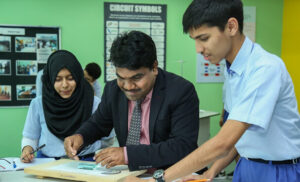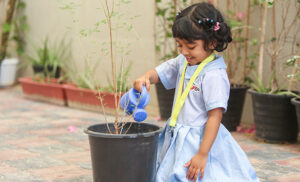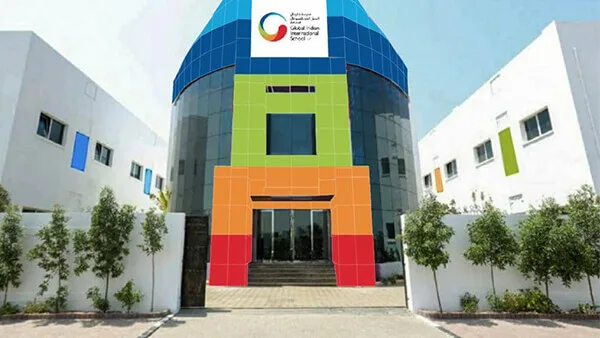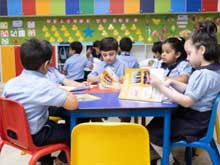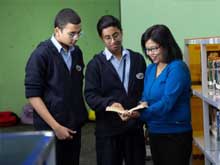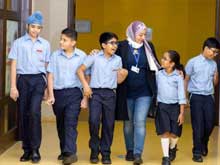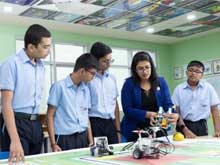Kindergarten English subjects include general awareness, remembering basic information, understanding climate, learning different types of animals and birds, etc.
Students learn and understand topics like About Me, Body Parts, Family, Home, School, Seasons, Fruits and Vegetables, Vehicles, etc. There are also activities and practical sessions to develop good habits and etiquette in children.
Easy Tips to Help Your Child in Learning English in KG Class?
The students in Kindergarten need to focus on two things, a letter book and an English word book, in order to learn English.
Most working parents struggle to provide the time to teach at home. So, if you are one of those parents who wants to develop English literacy skills from a young age, but do not know how to proceed then here are some effective ways that will help you to develop those skills in your child which professionally trained teachers use.
So let’s understand the strategies that you can implement while teaching English for the kindergarten curriculum at home and enhance the learning of your young child.
1. Build the Habit of Reading Story Books in English
Parents should make sure to put their children into the habit of reading story books in English from childhood (as early as possible) as they will get into the habit of speaking fluently. This small 10 minutes of reading session during nighttime, will make them comfortable with the English language.
You can make it fun by introducing attractive graphics/picture stories books which will encourage them to read and enjoy it and they won’t find it a burden or a big task.
Kindergarten students have a short span of attention or concentration, so use interesting picture books to teach English at home as it will help them to concentrate for longer.
2. Motivate Kids to Read Aloud and Then Write the Same
First step to learning English is the motivation or excitement of learning, so encourage them by giving good graphical interactive story books. Ask them to read aloud and then write, this will help to remember things for longer. It will also help them in correct pronunciation, and word clarity and build confidence in reading and expressing.
Provide them colourful pencils to write as it can be a fun and creative way to engage them in an activity which otherwise will make the task mundane. Children love colouring so involving drawing and colouring to write and learn can be fun for them.
For eg:- This can be used while teaching them animals, birds’ names, shapes, etc
3. Do Not Just Stick to Books but Involve Them in Learning Using Daily Life Activities
Be creative and involve learning lessons using daily life activities as this can be interesting and easy for little ones to understand. Sticking just to books for knowledge can be boring to them. For eg:- Knowledge is everywhere; so involve them in daily activities such as when you are cooking food in the kitchen so that they can understand basic things to learn English.
Give a nice safe place to sit and learn and carry on their activity so that you can watch them and work as well. Provide them with dough and ask them to create various shapes using it.
Give them veggies and ask them to count, and ask them about colours. You can take them to the park and ask them to collect leaves of different sizes and shapes and colours and ask them to sort them. You can utilize any place or activity and make it a fun lesson for them.
4. Involve Various Topics
As discussed above, KG 2 English Topics include various things like good habits, etiquette, manners, healthy living, the importance of greens, planting trees, hygiene, etc. So, involve all these topics or lessons at home in various ways.
5. Practice Book
You can provide your child a practice book so that they can carry on the activities for the classroom at home too. You can take their handwriting practice, letter or word reading, animal or bird name practice, picture recognition, etc.
Difference Between KG 1 and KG 2 English (create a table to show the difference)
Students of KG 1 and KG 2 learn about 4 units of inquiry at each grade level which we will highlight below. The curriculum is designed by keeping learners in mind where they learn key content, skills and attitudes.
4 Stages or Units of Inquiry
● Who are we?
● How do we express ourselves?
● How the world works?
● How do we share the planet?
In KG1 English
Who Are We?
Children learn about Self-awareness which is developed by learning more about ourselves.They inquire about the learning such as What I am learning, Discoveries about myself and others, etc.
Also Read: How to Improve Listening Skills in Toddlers?
How Do We Express Ourselves?
Children use the arts and imagination to share ideas and explore
How the World Works?
Children learn about the earth’s natural cycles and how it directly affects our lives. Teachers help them to notice routines and patterns in days and nights and explore seasonal changes.
How Do We Share the Planet?
How animals contribute to our lives and how to care for animals and why people keep animals.
In KG2 English
Who Are We?
Children learn how friendship is important and how it enriches our lives and how to nurture it in order to develop.
How Do We Express Ourselves?
Children learn about emotions and various feelings and experiences. They learn to express themselves through music, drama, and storytelling.
How the World Works?
Children learn how different kinds of materials and their uses or properties
How Do We Share the Planet?
Children learn about the different planets and learn about the importance of keeping our planet healthy too.
What Kids Will Learn in Kg 2 English? (Like Letters, Consonants, Vowels, Etc)
In K2 English, kids typically learn; 26 alphabets, i.e; Vowels (A, I, E, O, U) and the rest 21 Consonants (B, C, D, F, G,H, J, K, L, M, N, P, Q, S, R, T, V, W, X, Y, Z,)
Basic and Important English Words to Teach Kindergarten Kids (Include a separate list of sight words for preschoolers)
In order to have good reading skills in children, it is necessary to build a critical skill of having a solid foundation of knowing, reading or recognition of sight words. Teach these sight words for preschoolers mentioned below.
| A | An | At | Are |
| As | At | And | All |
| About | After | Be | By |
| But | Been | Can | Could |
| Called | Did | Down | Do |
| Each | From | First | Find |
| For | He | His | Had |
| How | Has | Her | Have |
| Him | In | I | If |
| Into | Is | It | Its |
| Just | Know | Like | Long |
| Little | My | Made | May |
| Make | More | Many | Most |
| Not | No | Now | Or |
| One | Of | Out | Other |
| Over | Only | On | People |
| Said | She | Some | So |
| See | The | To | They |
| This | There | Them | Then |
| These | Two | Time | Than |
| That | Their | Up | Use |
| Very | Was | With | What |
| Were | When | We | Which |
| Will | Would | Words | Where |
| Water | Who | Way | You |
| Your |
Fun Activities for Kids to Teach KG2 English in Class
1. Flashcard
Teachers can use flashcards as an interactive game. It is one of the most entertaining ways of involving and engaging children in vocabulary learning and teaching English to preschoolers. Use colourful flashcards to help children learn about different topics.
2. Fishing For words
Here, teachers can provide children with the materials to prepare fish cutouts, colour and decorate them, and then they can write one simple word or sight word on it. You can give them a magnetic fishing rod to catch the fish and ask them to read out loud. Let each child get their turn to play and learn. This activity can be fun for all kids in the classroom.
3. Hot Potato
Teachers can play music with a timer and provide balloons or any object and ask them to pass them to the kids beside them just like a passing game. When the timer stops the child who has the object to pick up one chit from the jar and read out loud. This can be a fun game when it is done fast. So try this fun English activity game in the classroom and let the atmosphere get filled with a lot of energy and good vibes.
4. Blindfold Guessing Game
The Best way to teach English is by involving children in any game, for eg:- Use a blindfolding scarf made of soft material and blindfolding each child during their turn and make sure they are not able to see anything. Give them a toy and ask them to guess, ask them to use their senses like how the items feel or ask them to recognize the sounds and guess what it is.
5. Acting
Give each child a card and ask them to act upon the topic or thing so that other children in the class can guess. This can be a fun and hilarious way for children to learn as it will help them to use their creative thinking.
6. I Spy
Teachers can make it simple by giving each child an alphabet and asking them to name things in the rooms from that alphabet. Make it interesting by asking children to guess what it is, you can choose an object but without telling them what exactly it is, you can describe the features instead and let the young minds think what it could be.
Ask children to raise their hand if they guessed it and ask them to write on the board and read it aloud. This practice can improve their creative thinking, spelling, and spoken language.
7. Alien Invasion
In this game, make one child an alien and ask children to assume that the child is alien. Ask each child to make them understand the topic which they have learned just now. It can be really fun and can get exciting when you see children use their creative ways to explain what they have learned in various ways to the alien kid.
Teachers can give marks to each child depending on how they have explained. Set the goal and challenge children to reach that level.
8. Scavenger Hunt
Hide a list of things and ask children to find out by giving them clues through various chits.
Using fun English activities for kindergarten in your English class can help children to be engaged and learn.
10 Tips for Teaching KG 2 English to Kids at Home
Reading may feel complex to your child so you have to involve interesting ways to teach them to read. Teaching your child to read means you need to make them aware of various skills and strategies, such as phonics, letters, and sounds.
Many parents would like to teach their children English at home, but don’t know how to start. So use these tips and tricks mentioned below to make it a rewarding experience for your child.
1. Involve Songs and Rhymes
Involve songs and nursery rhymes during reading sessions to build phonemic awareness. They are also fun for children to hear the sounds and learn. Another activity to do is ask them to clap rhythmically together while reciting songs, teach them first and then ask them to do it.
This playful way to learn develops phonemic awareness and literacy skills that will set them up for reading success.
2. Card Game
Cut out small cards and write simple 3 letters and words containing 3 sounds on each one (e.g. ram, cat, pig, top, sun, pot, fin). Ask them to read it and ask them what is the first sound they hear. Definitely, this will take time and your child will become more aware through regular practice.
The essential phonics practice will help your child learn how words sound and if your child is just starting, then make sure you help them learn to focus on the sound of each letter.
3. Create/Involve Print-rich Activity
Create a print-rich environment at home which will help them in their reading skills.
For eg:- You can post (posters, charts, and labels in their room or any place in your home wherever possible where they spend most of the time so that they can see and read and learn. You can also use outdoor places to involve them in learning such as asking them to read letters on billboards, posters, signs, etc. Ask them what the first letter sounds like. Or what word rhymes with that word? This will make them think, understand and learn.
4. Play Word Games
Introduce your child to simple word games or kindergarten words. You can help them to understand earlier and then slowly ask them to do it themselves. For eg:- You can say one simple word and ask them to say any word that comes first in their mind and slowly introduce them to rhyming words. Make it a fun experience so that they will enjoy learning and even do it by themselves.
5. Introduce Skills in English Teaching Activities
Make your child aware of the 5 skills involved in reading such as:-
● Phonemic Awareness
The ability to hear, notice, think and manipulate the different sounds in spoken words
● Phonics
Understanding the connection between letters and the sounds
● Vocabulary
Understanding the meaning of words OR definitions
● Reading Comprehension
Understanding the meaning of text written in any books
● Fluency
The ability to read, write, understand and speak all with accuracy
Create an interactive activity that involves one thing at a time so they learn and understand things correctly. Be patient with them and give them enough time to grasp and slowly they will understand with regular practice.
6. Rewards
In order to involve your child in learning, the process should be enjoyable which will encourage or excite and motivate them. They might be full of excitement in the initial days but later they will find themselves overwhelmed and give up easily, so make sure you involve various interactive and fun ways and not one process that will get them bored easily.
Reward them for completing preschool English activities and tell them about the new levels they need to achieve and the rewards they will get in order to keep them motivated.
7. Read Together
Read out to them on a regular basis and ask them questions related to it so that you know they understood the content and it also helps them to remember things. Reading will also help them to get acquainted with many skills. You can ask them to read out for you. These 10 minutes of regular practice will develop a love of reading in them.
8. Learning Sight Words in Kindergarten
It is essential for children as it will help them to become fluent readers. Most children learn a few sight words (is, it, my, me, no, see, we) at the age of 4 and around 20 sight words by the end of their first year of school. So do not stress much as they will learn as they grow. Introducing them to sight words as early as possible and involving them in regular practice can benefit them.
9. Keep It Simple
Use a lot of visuals to engage them. You can make use of interactive games or apps on mobile. Use their interest and create a learning session around it. Establish a routine by involving different activities for English learners every day and focus on one lesson at a time.
10. Be Patient
Every child learns at their own pace, so make it enjoyable so that they learn and grasp it quickly and develop a love for learning.
Conclusion
KG is your child’s first official year of school and the curriculum is focused on mastering letters, sounds, words, vocabulary, reading, and key fundamentals of maths. By the end of the year in school in Abu Dhabi, they will be able to count to 30, recognise shapes, single-digit addition and subtraction and other various skills. It’s important to realise that kindergarten is basically to develop skills and build self-confidence and develop a love of learning in them so that it lasts throughout their life.




